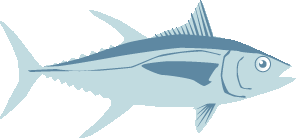Overview
What is a Completed FIP?
Completed FIPs are those that have independent verification that they have achieved their environmental objectives and/or graduated to MSC full assessment or other program assessment. Completed FIPs no longer report on their environmental performance but may choose to voluntarily report on their social performance.
Date of Completion: Feb 2020
Explanation of Completion: FIP entered MSC full assessment in February 2020 as "Indonesia pole-and-line and handline, skipjack and yellowfin tuna of Western and Central Pacific archipelagic waters" and achieved certification in January 2021.
Yellowfin tuna is an important artisanal fishery, supporting the livelihoods of coastal communities in the Banda Islands.However,there is no accurate catch data on of the handline yellowfin tunafisheries. Banda Islands situated in the Banda Sea, and part of the Western Central Pacific Ocean. Administratively, Banda belongs to Maluku Province. The Archipelago was famous once as the only world’s source of the nutmeg until the mid-19th century.
In the region, yellowfin tuna contributes to about 4% of total fish landing in Maluku Province, putting this fishery in number 6 of top fisheries commodities from Maluku Province, following other fish (21%), skipjack (10%), scad (7%), eastern little tuna (7%) and mackerel (5%). The Banda Sea is one the main sources of coastal tuna fishery for export.
At the regional level, The estimates of the latest (2012) and current (2008-2011) spawning biomass of the yellowfin tuna in the Western Central Pacific Ocean are both above levels necessary to produce the maximum sustainable yield (MSY). This indicates that that the population is not in an overfished state. Fishing mortality levels have been increasing over time but are still below levels needed to produce the maximum sustainable yield. Therefore overfishing is not occurring. Although it should be noted that catches in recent years have been close to or exceeded MSY by up to 13%. The biomass of yellowfin tuna has declined over time and fishing mortality rates for juveniles and adults have increased over time. Depletion estimates have also increased over time, reaching 60% of unexploited levels in 2012. While this is considered a moderate level of depletion, depletion in equatorial waters is considered to be higher – indicating that these regions may be fully exploited (Davies et al. 2014in Fishsource – http://www.fishsource.com/
This FIP is part of the Full Assessment for MSC Certification, in which AP2HI (Association for Pole and Line and Hand Line Indonesia) is the client, and Intimas Surya (FIP leads) is a member of AP2HI. The assessment has taken place since December 2019.
Yellowfin tuna is an important artisanal fishery, supporting the livelihoods of coastal communities in the Banda Islands.However,there is no accurate catch data on of the handline yellowfin tunafisheries. Banda Islands situated in the Banda Sea,
FIP Aim and Objectives
The overall objective of this FIP is by 2020 the FIP will achieve a level of performance consistent with an unconditional pass of the MSC standard
The FIP aims to support and contribute to the development of the improvement and sustainability of the small scale handline tuna fishery in Indonesia.The FIP involves over 300 fishers from Banda islands operating in the 50 to 60 nautical miles from their villages into Banda Sea. The FIP steps are to start with some improvement measures, which will likely be further developed as time progresses.
Objectives:
- To promote traceability to ensure that the origins and status of tuna products purchased are well-known and all coming from legal fisheries by engaging the supply chains that support improvement by 2020.
- To improve the availability of accurate data on catches, retained and by catch by 2020.
- To ensure the fishery has minimum impact towards ETP by 2020
FIP at a Glance
| 11% | 18% | 71% |
This pie chart represents completed environmental actions. Non-completed environmental actions may contain completed sub-tasks that are not illustrated here. For more information on environmental action progress visit the Actions Progress tab.
- Complete
- Incomplete
Roundtable

